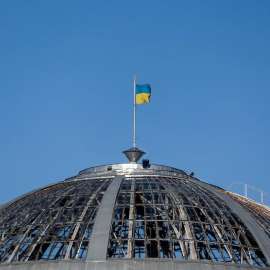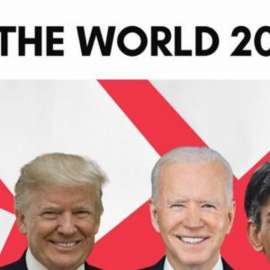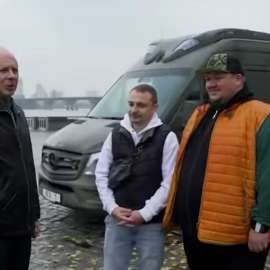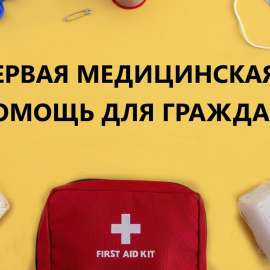
CEPA Analytical Center published an article by Katerina Odarchenko on Russian interference in Slovak elections
The Slovak election showed Russian interference in Western democracies is ramping up, threatening to sow distrust across Europe. There is an urgent need for NATO member states to act.
NATO views disinformation as “activities (which) seek to deepen divisions within and between NATO member countries and ultimately weaken the Alliance.”
Elections in Slovakia, Serbia, the Czech Republic, Poland, and the Netherlands show the alliance’s defenses have failed.
The Kremlin aims to increase discord among Europeans and divert attention from its continuing war crimes in Ukraine, so encouraging division and magnifying its influence. The Slovak vote in September demonstrated that Russian information operations have remained consistent, but are now applied to focused topics and boosted by local sympathizers willing to champion their narratives.
Slovakia’s pro-Russian SMER-SD (Course-Social Democracy) party received almost 23% of the vote in parliamentary elections on September 30, reflecting a shift in the country. Its Kremlin-friendly, populist prime minister, Robert Fico, uses Putinist rhetoric to distort facts about Ukraine and has proposed a halt to military aid to Kyiv.
On January 20, for example, he said that Ukraine was not a sovereign state since it was run by the United States and that it would have to sacrifice territories to the Kremlin.
Slovakia is of special interest because there are no traditional Russian propaganda resources, like Sputnik or RT, to broadcast in the national language. (Though Sputnik does have a Czech-language edition and the languages are mutually intelligible.)
“The penetration of pro-Kremlin propaganda narratives into the Slovak information space has been occurring since 2014,” according to a report by the Warsaw Institute.
It was then that “the emphasis on deceptive narratives about the alleged oppression of the Russian minority in Ukraine, Western political and societal decadence, or the allegedly strong background of the far right in Ukrainian society and politics intensified,” it said.
The research found that the Kremlin utilizes a range of resources, including embassies, spies, and local collaborators, as well as social media, to advance its goals and spread propaganda in Slovakia.
Key narratives include portraying Russia as a victim, a protector of traditional values, and a natural Slavic ally while misusing historical parallels to boost positive sentiment. History is also rewritten to present Moscow in a positive light and detract from its war crimes in Ukraine.
Criticism is deflected by labeling opponents as Russophobes, a narrative propagated by figures such as Slovak MEP Milan Uhrík, chairman of the far-right Republika party.
A similar tactic was used in Germany in 2016 when the Lisa Case, a fictitious story about the rape of a girl by immigrants, was spread by Russian propaganda channels to divert attention from Russian war crimes in Aleppo.
A few days before the full-scale invasion in February 2022, Defense Minister Jaroslav Nagy said some Slovak media resources were directly funded by Moscow. With the outbreak of war, the Slovak government quickly blocked pro-Russian online channels because they were deemed to be spreading content harmful to the interests of the state.
The threat was underlined when an employee of the website Hlavné správy was caught receiving money from a Russian intelligence officer in return for publishing pro-Russian material.
In a statement issued before the 2023 election, Sergei Naryshkin, Russia’s foreign intelligence chief, accused Washington of interfering in Slovakian politics to boost progressive candidates. The foreign ministry in Bratislava summoned a Russian embassy official and called on Moscow to “stop disinformation activities aimed at Slovakia.”
The week after the election results were announced, the outgoing foreign minister Miroslav Wlachovský stated that the Kremlin had a well-developed network of influencers in Slovakia and had sought to alter public opinion in the run-up to the elections.
Former Slovak defense minister Jaro Naď added fuel to the fire with a claim that Russia’s interference included troll farms, the secret funding of municipalities across Slovakia, and “significant involvement of the Russian secret service.”
A poll conducted by GLOBSEC suggests Moscow’s misinformation is cutting through. Only 40% of Slovaks believe Russia is responsible for invading Ukraine, compared to 51% just a year earlier.
Slovakia is not an isolated example. In 2023, Russia also sought to influence election races in Poland, Argentina, the Czech Republic, Serbia, and the Netherlands. This year will be especially busy, with the US, Germany, Great Britain, Moldova, Austria, and the European Parliament all holding votes.
NATO constantly monitors and analyzes information relevant to members, including tracking and analyzing sources of disinformation. It also actively engages with the public to counter disinformation.
To make these efforts more effective, the alliance must allocate more resources for technological infrastructure to detect and prevent Russian (and other) campaigns. Cooperation between members and non-member countries should be strengthened to facilitate monitoring and, eventually, the design of common responses when they are needed.
If NATO member states fail to recognize the threat and take appropriate measures, this dangerous trend will weaken support for Ukraine in Europe and enable the aggressor’s campaigns of distortion to prosper.
Kateryna Odarchenko is a political consultant, a partner of the SIC Group Ukraine, and president of the PolitA Institute for Democracy and Development. A specialist practicing in the field of political communication and projects, she has practical experience in the implementation of all-Ukrainian political campaigns and party-building projects.
Europe’s Edge is CEPA’s online journal covering critical topics on the foreign policy docket across Europe and North America. All opinions are those of the author and do not necessarily represent the position or views of the institutions they represent or the Center for European Policy Analysis.
Новости
Оккупанты пожаловались на массированную атаку дронов
11:55 27 апр 2024.
Россия атаковала энергетические объекты на Львовщине
11:15 27 апр 2024.
На Днепропетровщине повреждены два энергообъекта
10:50 27 апр 2024.
Стало известно, сколько ракет сбила украинская ПВО этой ночью
10:10 27 апр 2024.
РФ обстреляла 4 теплоэлектростанции этой ночью
09:50 27 апр 2024.
В Смеле ликвидируют последствия вражеской атаки
09:00 27 апр 2024.
Роберт Дауни сделал неожиданное заявление
08:30 27 апр 2024.
Военного-взяточника задержали в Одесской области
04:40 27 апр 2024.
СБУ задержала торговцев российским оружием
02:20 27 апр 2024.






























































